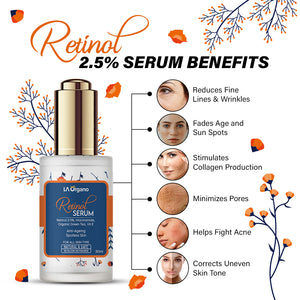Retinol is a very popular ingredient in skincare. It can make skin look younger and help with acne. However, there are many misunderstandings about retinol. This article will explain what retinol does and how to use it safely. We'll also clear up some common myths.

What is Retinol?
Retinol is a type of retinoid. Retinoids come from vitamin A. You can find it in many over-the-counter skin care products, like serums and creams. When you put retinol on your skin, it changes into retinoic acid. This helps your skin create new cells faster and boosts collagen production. That's why it is effective for both acne and anti-aging.
Benefits of Retinol
Retinol has several key benefits for the skin:
-
Reduces Fine Lines and Wrinkles: It helps make fine lines less noticeable and makes skin firmer by stimulating collagen.
-
Clears Acne: It helps to unclog pores, which reduces whiteheads and blackheads and prevents future breakouts.
-
Reduces Hyperpigmentation: Regular use of retinol can even out skin tone by fading sun damage and dark spots.
-
Improves Skin Texture: It helps to get rid of dead skin cells, making your skin smoother and brighter.
How to Use Retinol Safely
To get the most out of retinol and avoid irritation, follow these tips:
-
Start Slowly: Begin by using it two or three times a week. Use a low concentration, such as 0.25% or 0.5%.
-
Use at Night: It's best to apply retinol at night because sunlight can break it down.
-
Moisturize: Always use a good moisturizer after applying retinol. This will help reduce dryness and peeling. You can also apply moisturizer before retinol.
-
Use Sunscreen: It can make your skin more sensitive to the sun. So, it's crucial to use sunscreen every day.
-
Avoid Harsh Ingredients: Don't use products containing benzoyl peroxide or AHAs/BHAs at the same time as retinol. This can irritate your skin.
Who Should and Shouldn't Use Retinol?
Most people can start using retinol in their mid-20s to early 30s as a way to prevent aging. However, if you have rosacea, eczema, or very sensitive skin, talk to a dermatologist before using retinols. Also, pregnant or nursing women are generally advised to avoid retinoids unless a doctor specifically recommends them.
Common Retinol Myths
Let's debunk some common myths about it:
-
Myth 1: Retinol thins the skin.
-
Fact: It actually increases collagen production, which thickens the dermis and strengthens the skin.
-
-
Myth 2: You'll purge for months.
-
Fact: While some initial breakouts (purging) can happen, it usually lasts only a few weeks.
-
-
Myth 3: You can't use moisturizer with retinol.
-
Fact: Using moisturizer with it is often recommended. You can apply it after or even before retinol (the "sandwich method") to help reduce irritation.
-
Top Retinol Products
Here are some popular products:
-
CeraVe Retinol Serum for Resurfacing: Great for acne-prone skin.
-
The Ordinary Retinol 0.5% in Squalane: Affordable and good for beginners.
-
Paula's Choice 1% Retinol Treatment: Stronger option for experienced users.
-
La Roche-Posay Retinol B3 Serum: Gentle and suitable for sensitive skin.
Final Tips
Consistency is key when using retinol. Start slowly, use sunscreen daily, and be patient. When used correctly, retinol can be a great ingredient for achieving smoother, clearer, and younger-looking skin.
References
-
American Academy of Dermatology Association. "Retinoids." https://www.aad.org/public/everyday-care/skin-care-secrets/anti-aging/retinoids
-
National Institutes of Health. "Vitamin A." https://ods.od.nih.gov/factsheets/VitaminA-Consumer/


No comments:
Post a Comment